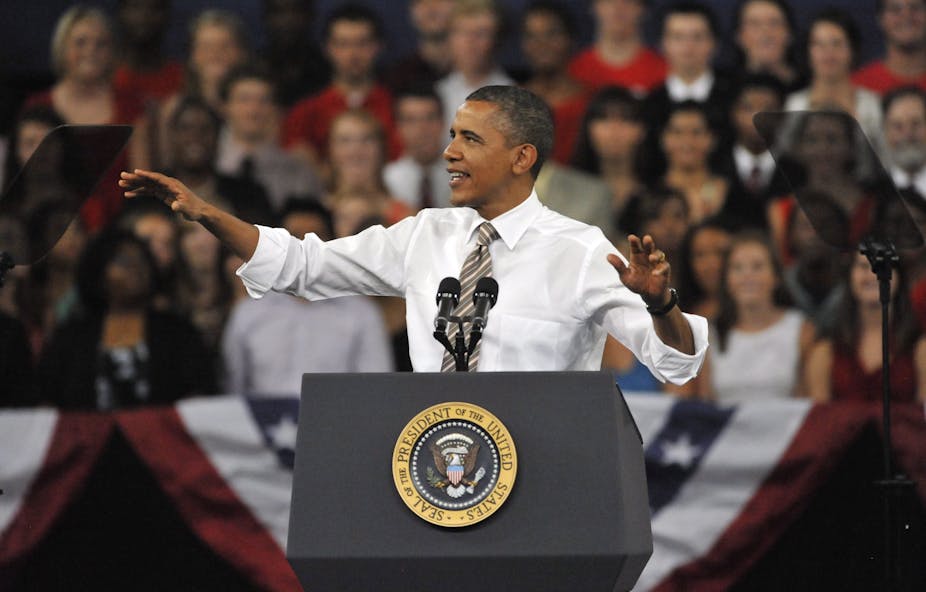President Barack Obama’s $US447 billion jobs plan appears to be struggling.
Republican resistance to some aspects of the rescue deal announced last week - particularly around government spending - was a certainty. But the New York Times is reporting some Democrats are also unhappy with supporting the bill as a whole.
Obama is in trouble not just because the US economy is in bad shape, or that some Democrats are disgruntled.
Obama has also lost control of the political “story”. In the process, he is losing legitimacy with the voters who once supported him.
In the heavily Democratic district of former New York congressman Anthony Weiner, Republican novice candidate Bob Turner, scored an upset by winning a special election to replace Weiner in Congress, based in large part on voter frustration with Obama.
One hears increasing reference to Obama as a “one termer”, to be consigned to the fate of Herbert Hoover or Jimmy Carter.
Economic fundamentals in poor shape
Most basically, the economic fundamentals are in poor shape. Three years into Obama’s first term, unemployment remains above 9% – which is 1% higher than when he took office.
The employment-population ratio, which provides a broader measure of employment across the entire workforce, stands at 58.4% – down more than 2% from his inaugural.
Speaking to broader trends, the US Census Bureau reported on Tuesday that median US household income had fallen over the past decade.
For the first time since 1996, median income has sunk below $50,000; for the first time since the Great Depression, American households have persistently lost ground over a decade.
Not of his making - but does it matter?
To be sure, most of this economic mess is not of Obama’s making. His defenders would likely counter that he prevented a far worse decline, and that the nearly $1 trillion stimulus passed in 2009 helped avert a second Great Depression.
Last week, Obama called forcefully for Congress to pass his jobs stimulus plan, which includes a payroll tax cut and an extension of unemployment benefits.
Yet, this initiative – even after it is passed in its likely watered-down form – is unlikely to do much for Obama.
Instead, it is “too little, too late” both economically and politically.
First, in purely economic terms, fiscal policy is always bedevilled by lags.
So even if passed this month, the impact of Obama’s measures would take nearly a year to make an impact.
The November 2012 election is 14 months away. It is unlikely this package will have any dramatic effects between now and then, with unemployment most likely to continue hovering above 8%.
Mishandling politics of stimulus and deficit
Secondly, on more political grounds, Obama has mishandled the politics of stimulus and deficit.
While the President’s defenders suggest that he has been constrained by Republican partisanship, this ignores his administration’s often-inexplicable support for the Republican agenda of fiscal austerity.
For example, it was not Republican pressure that forced Treasury Secretary Timothy Geithner last August to cast the economy as back on the “road to recovery” and to urge measures to “cut the deficit.” Such rhetorical miscues have only made Obama’s task that much harder.
Could it have been different?
Could Obama have done anything differently? Historians will likely cast early decisions to ease pressure on banks as fatal missteps.
The Treasury opposed a range of popular, constructive initiatives. In terms of financial reform, it prevented the imposition of caps on executive pay that could have provided a popular means to discourage excessive risk-taking.
Of more macroeconomic importance, US Treasury opposed bankruptcy reforms that would have given judges “cram-down” power to lower mortgage obligations.
In the process, this deprived the administration of a more permanent source of stimulus, one that might have freed up disposable income for years to come.
In a larger sense, the lesson of Obama’s first term is that economic trends do not “speak for themselves.” Politicians cannot just be technocrats.
The need for a consistent narrative
They also have to situate economic developments in a consistent narrative. Just ask Al Gore. From 1993 to 2000, the Clinton-Gore years were marked by the creation of 20 million jobs, an unemployment rate that fell below 4% and prolonged wage-price stability.
Yet, as a candidate, Al Gore was incapable of convincing the American people that Clinton-Gore policies deserved any credit for the boom.
Instead, then-Governor George Bush succeeded in attributing the boom to the free market, technological development, and the entrepreneurial vision of the American people with the boom.
Bush was consequently awarded with victory in the November 2000 elections.
Obama has similarly failed to convince the American people that his policies have done much good.
Instead, his intermittent support for austerity has crippled his efforts to implement any new stimulus.
For this reason, he seems destined for a fate similar to that of Gore’s, with January 2013 likely to witness the beginning of a Republican, Romney or Perry, administration.

